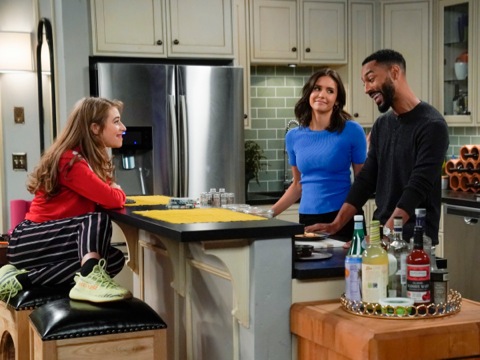CBS' Fam is racially diverse without calling attention to the obvious
01/09/19 10:13

PREMIERING:Thursday, Jan. 10th at 8:30 p.m. (central) on CBS
STARRING: Nina Dobrev, Tone Bell, Odessa Adlon, Sheryl Lee Ralph, Brian Stokes Mitchell, Gary Cole
PRODUCED BY: Corinne Kingsbury, Aaron Kaplan, Wendi Trilling, Dana Honor
By ED BARK
@unclebarkycom on Twitter
It’s been nearly half a century since CBS dared to launch one of television’s all-time milestones, All in the Family.
The network’s Fam, which premieres on Thursday, Jan. 10th, is also something of a benchmark. Back in 1971, no one had seen anything like the blue collar bigotry of Archie Bunker. At least not on TV they hadn’t. His blundering racism, fueled more by ignorance than outright malice, drove All in the Family into the uppermost regions of the prime-time ratings. For five straight seasons, it ranked No. 1.
Fam, which will be replacing CBS’ awkward Murphy Brown reboot, can’t hope to aspire to such heights. But in its own little way, it may prove to be of considerable significance for a network that this season has honored its pledge to bring more diversity to its schedule, both on- and off-camera.
The racial dynamics of Fam, created by Corinne Kingsbury, are unique in terms of race not being an issue at all in the three episodes made available for review. As with All in the Family, we’ve never seen anything quite like this on a Big Four broadcast network, let alone CBS.
Clem (Nina Dobrev), short for Clementine, is newly engaged to Nick (Tone Bell). She’s white, he’s black and his parents likewise are an interracial couple, but in reverse. Rose (Sheryl Lee Ralph) is black, her husband, Walt (Brian Stokes Mitchell), is a light-skinned racial blend -- and what’s the big deal? Fam so far is completely color-blind in that respect.
The fifth and sixth wheels are Clem’s slacker 16-year-old half-sister sister Shannon (Odessa Adlon) and their absentee father, Freddy (Gary Cole), a homicide detective who spouts lines like, “Women are whack jobs. You guys are angry, like all the time.”
Clem sees her father as a “narcissistic psychopath,” and is so ashamed of him that she’s told Nick he’s dead. But there’s no sitcom drama in that. So he re-enters the picture shortly after destitute and disruptive Shannon unexpectedly pops in to crash with Clem and Nick. Of course she’ll be staying a while after giving the show its title by saying, “No one says ‘family’ anymore. It’s fam.”
Other conventional sitcom trappings also apply. CBS for the most part still clings to over-active laugh tracks and broadly played scenes and situations. Still, this is a nicely clicking ensemble that gets sharper as the show goes on. Cole’s loutish Freddy, prominent in the first two episodes before being left out of the third, brings an extra zing to these proceedings, particularly when he’s invited to Rose and Walt’s house for dinner in Episode 2. He shows up with a nice bottle of wine that was “swiped from the evidence locker” and still has blood stains on it. But it’s still too good a bottle for the discerning Walt to pass up.
Episode 3 treads familiar turf. Nick and Clem aren’t “getting any” lately because intrusive Shannon is always around and invariably knocking on their bedroom door. Will they be able to satisfy their escalating urges during a 30-minute window between Shannon’s scheduled departure to her new high school and the couple’s off-to-work exits? Of course not, but they’re more than likable enough to prompt a rooting interest.
Nick’s mama Rose dotes on when her Tupperware container is going to be returned while grandiosely planning for her son’s wedding. She’s a fun character, as is Mitchell’s Walt, a former Broadway musical actor who breaks into song to the delight of his wife. (In real life, Mitchell is a Tony Award-winner for his performance in a 2000 revival of Kiss Me, Kate. “My family’s very, very mixed,” he’s been quoted as saying. “I am, I guess, a kind of melting pot person.”)
Fam perhaps will deal with racial issues in future episodes. But so what if it doesn’t? Shouldn’t America be ready by now for a show that says, “There’s nothing to look at here” in terms of two interracial couples getting along just fine and wrestling with predicaments that transcend the color of their skins?
An ideal world certainly isn’t the real world just yet, and some might criticize Fam for being in a vacuum. I’m not going to be one of them, because this is where we’re supposed to be headed. Maybe this is a show that can help us get there just a little bit faster.
GRADE: B
Email comments or questions to: unclebarky@verizon.net
